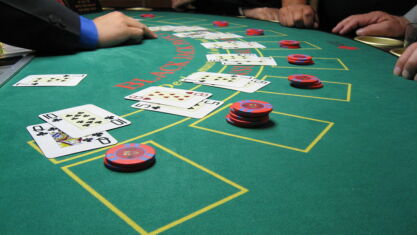Betting plays a crucial role in any poker variation, including the most popular one. Texas Holdem betting rounds determine the fate of your chips and potential winnings, so it’s important to know how to adjust strategies depending on your cards. If you are a beginner, proceed with explanations of wagering in poker. If you have experience in the game, learn how to choose the best strategy for each round.
Texas Holdem betting rounds & basic rules explained
Texas Holdem is probably the most well-known poker game. It is a community card game where players aim to make the best possible hand using a combination of their hole cards and shared (community) cards.
The game begins with each player being dealt two hole cards, which they keep hidden from other players. Once every player receives his cards, the first round of betting begins. This is where players analyze their hole cards and decide whether to bet, raise, call, or fold. The betting action starts with the player to the left of the big blind and continues clockwise around the table. The main goal is to combine community cards with hole cards and form the best possible hand of five cards. At the end, all remaining players reveal their cards and the highest hand wins.
In total, there are four Texas Holdem betting rounds in the game. They are called pre-flop, flop, turn, and river. Players place bets every time before the next community card is dealt, meaning there are four wagering rounds. Let’s take a closer look at them.
Pre-flop
Pre-flop is the first betting round, so it sets the tone for the rest of the game. The decisions made during this round can greatly influence the outcome; therefore, it is crucial to carefully consider your hand strength, position at the table, and the actions of other players before making your move.
If you have a strong hand, such as two Aces or Kings, you can raise the bet to build the pot and narrow down the field. This helps in eliminating weaker hands and maximizing your potential winnings. However, if you have a weaker starting combination, all online poker guides for beginners advise you to fold and conserve your chips for better opportunities.

Flop
When the pre-flop betting round is complete, the dealer places three community cards face-up on the table. This is known as the flop. It begins with the player on the dealer’s left and follows the same clockwise order as the pre-flop.
During this round, players have more information to work with, as they can now see more cards. This additional information allows for more strategic decision-making. Players can assess the strength of their hand, potential combinations, and the odds of improving their hand in next rounds.
If you have a strong hand after the flop, continue betting or raising to build the pot and extract value from your opponents. However, if your hand did not improve or is relatively weak, it might be wise to fold and cut your losses. Remember, poker is a game of calculated risks, and sometimes folding is the best option to minimize potential losses.
Turn
Once the flop betting round is complete, the dealer places a fourth community card, known as the turn, on the table. The 3rd of four Texas Holdem betting rounds follows the same pattern as the previous rounds, starting with the player to the left of the dealer. Read where to sit at a poker table to maximize your winning chances.
The turn card can significantly impact the strength and potential of hands. As a player, you need to reassess your position and the strength of your hand based on the new card. If you have a strong hand, it is crucial to continue betting or raising to build the pot and put pressure on your opponents. However, if the turn card weakens your hand or gives potential draws to your opponents, you should consider folding, too.
River
River is when the dealer places the fifth and final face-up card on the table. At this stage, all community cards are visible to all players. It is now a battle of wits, as players must make their final decisions based on their hands, reactions of their opponents, and personal bluffing skills. This is the last opportunity to bet, raise, call, or fold before revealing the hands and determining the winner after all Texas Holdem betting rounds.
















